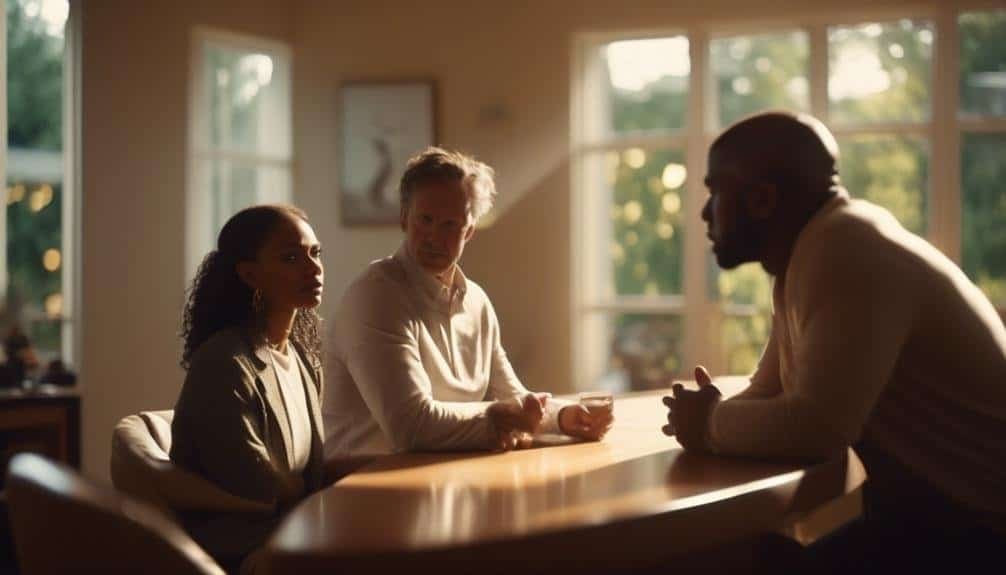Can Coaching Help With Conflict in Relationships?
Imagine you're driving down a road and suddenly, you encounter a detour sign. Frustration sets in as you realize you'll have to take a different route to reach your destination.
Similarly, conflicts in relationships can arise unexpectedly, causing detours on the path to harmony and understanding. But here's the question: can coaching be the GPS that guides you through those detours and helps you find your way back to a fulfilling relationship?
Well, the answer lies in exploring the role of coaching in addressing conflict within relationships, understanding patterns of conflict, enhancing communication skills, building empathy and understanding, identifying and addressing limiting beliefs, developing effective conflict resolution strategies, navigating power dynamics, and maintaining long-term relationship satisfaction.
So, buckle up and prepare to discover how coaching can potentially transform your relationship's journey.
Key Takeaways
- Coaching provides guidance and tools for effective communication and problem-solving in relationships.
- Understanding patterns of conflict leads to healthier and more fulfilling relationships.
- Conflict resolution strategies such as compromise, collaboration, and seeking understanding can lead to mutually satisfying resolutions.
- Enhancing communication skills, including active listening and emotional intelligence, can help resolve conflicts and foster growth in relationships.
The Role of Coaching in Relationship Conflicts
Coaching plays a crucial role in navigating and resolving conflicts within relationships, offering valuable guidance and tools for effective communication and problem-solving.
When it comes to understanding relationship dynamics, coaching can provide you with the necessary insights to comprehend not only your own behavior but also the patterns and triggers that exist within your relationship. Through coaching, you can gain a deeper understanding of how your actions and words affect your partner and how their actions and words affect you.
Furthermore, coaching can help improve emotional intelligence, which is essential for managing conflicts in relationships. By enhancing your emotional intelligence, you can better recognize and regulate your own emotions and empathize with your partner's feelings. This increased awareness and empathy can foster healthier communication and lead to more productive conflict resolution.
Coaching also equips you with practical tools to address conflicts in a constructive manner. You can learn effective communication techniques, such as active listening and assertive expression, which can help you express your needs and concerns without causing further harm. Additionally, coaching can provide you with problem-solving strategies to find mutually beneficial solutions and cultivate a stronger, more resilient relationship.
Understanding Patterns of Conflict
Understanding patterns of conflict is crucial in navigating and resolving relationship issues. By recognizing common conflict resolution strategies, you can gain insight into your own patterns and those of your partner.
Additionally, identifying communication breakdowns will allow you to address them effectively, leading to healthier and more fulfilling relationships.
Conflict Resolution Strategies
When conflicts arise in relationships, it can be helpful to recognize and understand the patterns of conflict that often occur. By understanding these patterns, you can develop effective conflict resolution strategies to navigate through difficult situations. Conflict management is an essential skill in any relationship, and problem-solving techniques can help you find common ground and achieve mutually satisfying resolutions.
Take a look at the table below to gain insight into different conflict resolution strategies:
| Conflict Resolution Strategies | Description |
|---|---|
| Communication | Open and honest communication is crucial for resolving conflicts. Listen actively and express your needs and concerns clearly. |
| Compromise | Finding a middle ground where both parties are willing to give and take can lead to a mutually acceptable solution. |
| Collaboration | Work together to find creative solutions that meet the needs and desires of both individuals. |
| Understanding | Seek to understand the other person's perspective and empathize with their feelings and experiences. |
| Mediation | Consider involving a neutral third party to help facilitate the resolution process and ensure fairness. |
Communication Breakdowns
Conflict resolution strategies are essential in navigating through difficult situations in relationships. One area that often requires attention is communication breakdowns. When communication breaks down, it can lead to misunderstandings, frustration, and even resentment.
To improve relationships and address communication breakdowns, consider the following:
- Active Listening: Take the time to truly listen to your partner without interrupting or judging. Show empathy and validate their feelings.
- Clear Communication: Be clear and specific when expressing your thoughts and feelings. Avoid vague or ambiguous statements that can lead to confusion.
- Non-Verbal Cues: Pay attention to non-verbal cues such as body language and facial expressions. These can often reveal more about how someone is truly feeling.
- Seek Feedback: Ask for feedback to ensure understanding and to clarify any misunderstandings.
- Practice Patience: Recognize that effective communication takes time and effort. Be patient with yourself and your partner as you work towards improving your communication skills.
Enhancing Communication Skills
Improving how you communicate can be a game-changer in your relationships. When it comes to enhancing communication skills, there are two key areas to focus on: improving listening skills and fostering emotional intelligence.
Listening isn't just about hearing the words being spoken, but truly understanding the message behind them. It requires active engagement, empathy, and an open mind. By honing your listening skills, you can create a safe space for your partner to express themselves, fostering trust and deepening your connection.
Fostering emotional intelligence is equally important in effective communication. It involves recognizing and managing your own emotions, as well as understanding and empathizing with the emotions of others. By developing emotional intelligence, you can better express your feelings, thoughts, and needs in a way that's constructive and respectful. This allows for open and honest conversations that lead to resolution and growth in your relationship.
To enhance your communication skills, practice active listening by giving your full attention, maintaining eye contact, and paraphrasing what you've heard to ensure understanding. Additionally, work on developing your emotional intelligence by becoming more self-aware, practicing empathy, and using 'I' statements to express yourself without blaming or criticizing.
Building Empathy and Understanding
Building empathy and understanding is a transformative process that allows you to truly connect with your partner on a deeper level. It involves actively listening and putting yourself in their shoes, which can help build trust and strengthen your relationship. Here are some practical ways to build empathy and understanding:
- Practice active listening: When your partner is sharing their thoughts and feelings, give them your full attention. Put aside any distractions and truly listen to what they're saying. Show them that you value their perspective by nodding, making eye contact, and offering affirmations.
- Validate their emotions: Let your partner know that you understand and acknowledge their feelings, even if you may not necessarily agree with them. Validate their experiences and let them know that their emotions are valid and important.
- Seek to understand, not just to respond: Instead of immediately jumping in with your own point of view, take the time to understand your partner's perspective. Ask open-ended questions to gain more insight into their thoughts and feelings.
- Practice empathy outside of conflicts: Building empathy and understanding isn't just important during conflicts but also in everyday interactions. Show kindness, compassion, and understanding towards your partner in all aspects of your relationship.
Identifying and Addressing Limiting Beliefs
Now, let's talk about identifying and addressing limiting beliefs in your relationships.
It's important to challenge negative self-beliefs that may be holding you back from experiencing a fulfilling connection with your partner.
Challenging Negative Self-Beliefs
To overcome and grow beyond your limiting beliefs, it's crucial to identify and address them head-on. Challenging negative self-beliefs can be a transformative journey that helps you break free from self-doubt and transform your self-perception.
Here are two practical steps to help you on this path:
- Recognize the negative self-beliefs: Take a moment to reflect on your thoughts and emotions. Notice any recurring patterns of self-doubt or negative self-talk. Write them down, acknowledging their existence.
- Challenge and reframe: Once you've identified your negative self-beliefs, challenge them by asking yourself if they're based on facts or just assumptions. Reframe them into positive and empowering statements. For example, if you believe you aren't capable of success, reframe it to 'I have the skills and determination to achieve my goals.'
Overcoming Relationship Misconceptions
By examining and challenging your limiting beliefs about relationships, you can pave the way for deeper understanding, connection, and fulfillment. Misconceptions about relationships often stem from societal norms, past experiences, and unrealistic expectations. These misconceptions can hinder your ability to build healthy and thriving relationships. It is crucial to identify and address these misconceptions in order to overcome them and create more meaningful connections with your partner.
Here is a table that highlights some common relationship misconceptions and offers alternative perspectives to help you challenge and overcome them:
| Relationship Misconception | Alternative Perspective |
|---|---|
| Love means never disagreeing | Conflict is normal and can lead to growth and understanding |
| Happily ever after | Relationships require continuous effort and commitment |
| Your partner should complete you | Each individual should have their own sense of fulfillment |
| Mind-reading is necessary | Open and honest communication is key |
| Perfect relationships exist | Imperfections are part of every relationship; it's about embracing them and growing together |
Developing Effective Conflict Resolution Strategies
Are you struggling to find effective strategies for resolving conflict in your relationships? Conflict is a natural and unavoidable part of any relationship, but it doesn't have to be destructive. By developing self-awareness and learning to manage your emotions, you can navigate conflicts with greater ease and maintain healthier relationships.
Here are some practical strategies to help you resolve conflict more effectively:
- Developing Self-Awareness:
- Take time to reflect on your own thoughts, feelings, and triggers before engaging in a conflict.
- Understand your communication style and how it may impact the resolution process.
- Managing Emotions:
- Practice emotional regulation techniques, such as deep breathing or mindfulness, to stay calm and focused during conflicts.
- Express your emotions assertively and respectfully, avoiding blame or criticism.
Navigating Power Dynamics in Relationships
Navigating power dynamics in relationships can be challenging, but understanding and addressing them is essential for fostering healthy and balanced connections.
Power imbalances can emerge in various forms, such as one partner having more financial resources, holding a higher social status, or possessing greater decision-making authority. These imbalances can lead to feelings of inequality, resentment, and even abuse if left unaddressed.
To address power imbalances in your relationship, it's crucial to start by acknowledging and openly discussing them with your partner. Honest and open communication is key to understanding each other's perspectives and finding common ground.
It's important to recognize that power dynamics can shift and change over time, and the goal should be to establish a sense of equality and mutual respect. This can involve setting clear boundaries, actively listening to one another, and making decisions together.
It may also be helpful to seek the support of a relationship coach or therapist who can provide guidance and tools for addressing power imbalances and fostering a healthier dynamic in your relationship.
Maintaining Long-Term Relationship Satisfaction
To maintain long-term relationship satisfaction, it's important to continuously nurture and prioritize the emotional connection between you and your partner. Here are some practical ways to improve your relationship dynamics and foster emotional intimacy:
- Create quality time: Make an effort to spend quality time together, free from distractions. This could involve going on regular date nights, engaging in shared hobbies or activities, or simply having meaningful conversations.
- Practice effective communication: Communication is key to any successful relationship. Take the time to actively listen to your partner, validate their feelings, and express your own needs and emotions in a respectful and non-confrontational manner. Remember, open and honest communication builds trust and understanding.
- *Sub-list 1:*
- Use 'I' statements to express your feelings and needs.
- Avoid criticism and defensiveness, and instead, focus on problem-solving and finding common ground.
- *Sub-list 2:*
- Be mindful of your non-verbal cues and body language, as these can greatly impact how your message is received.
- Practice empathy and try to understand your partner's perspective, even if you disagree.
Conclusion
In conclusion, coaching can be a valuable tool in resolving conflicts within relationships.
By understanding the patterns of conflict, improving communication skills, building empathy, and addressing limiting beliefs, coaching helps individuals develop effective conflict resolution strategies.
It also assists in navigating power dynamics and maintaining long-term relationship satisfaction.
So, if you find yourself facing conflicts in your relationships, consider seeking coaching to help you create a harmonious and fulfilling connection.
Remember, love doesn't always have to be a battlefield.







